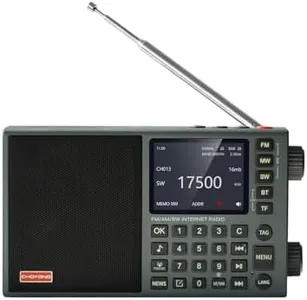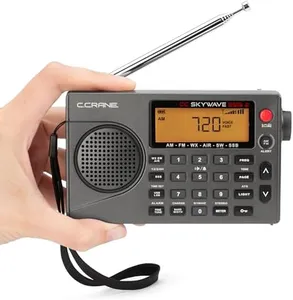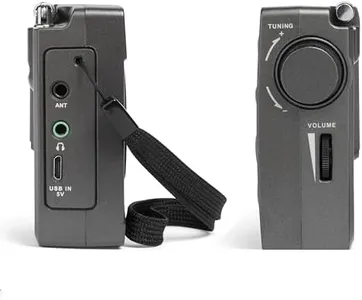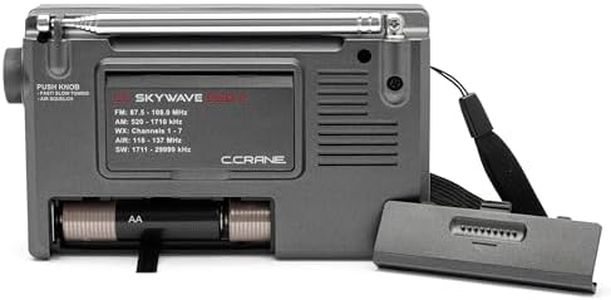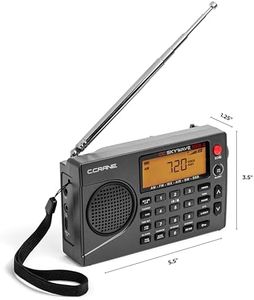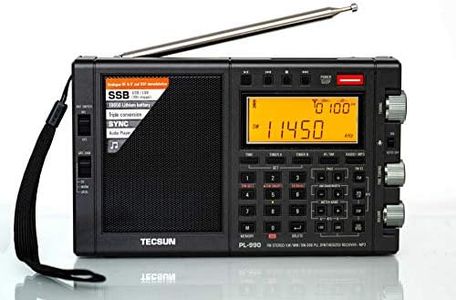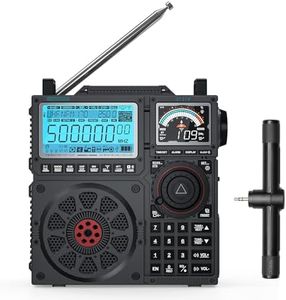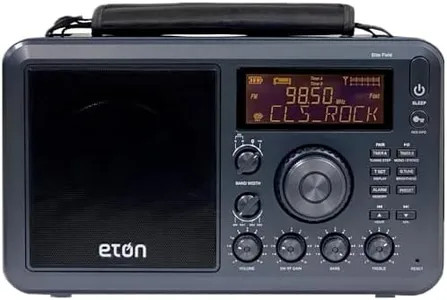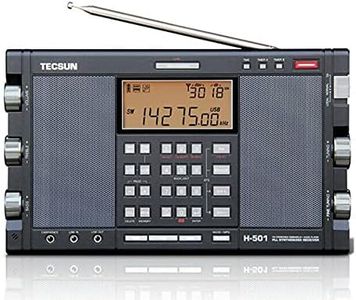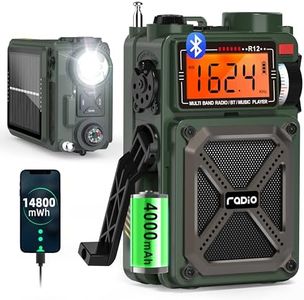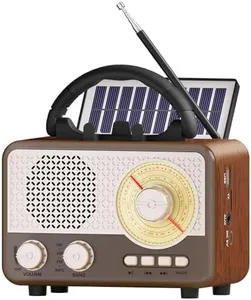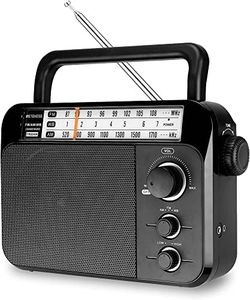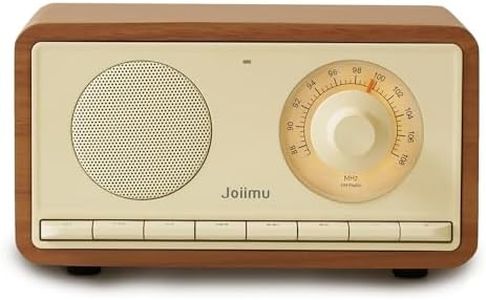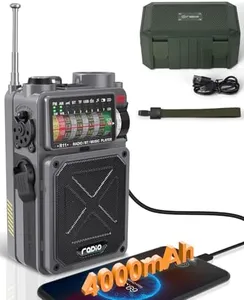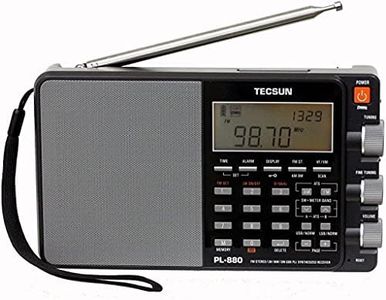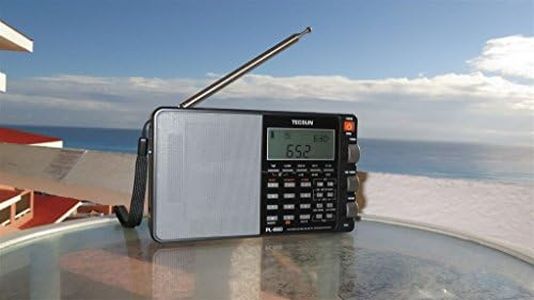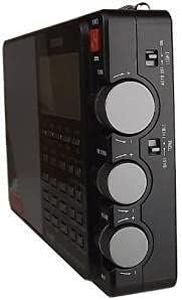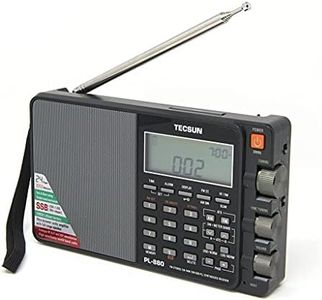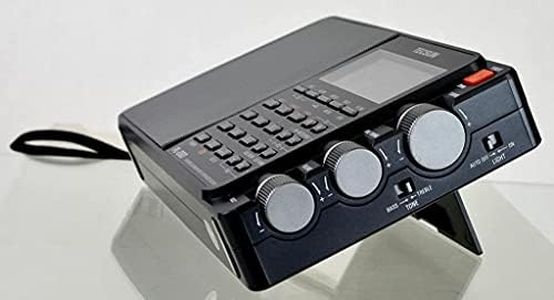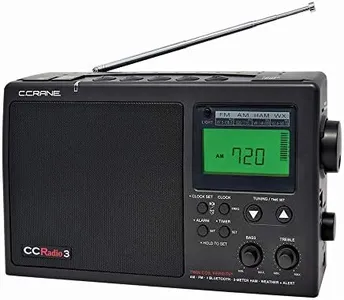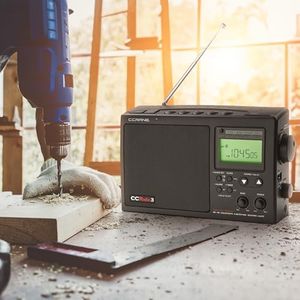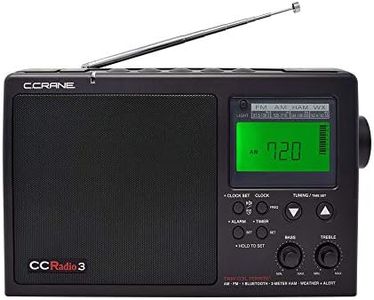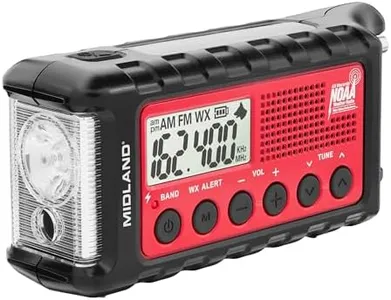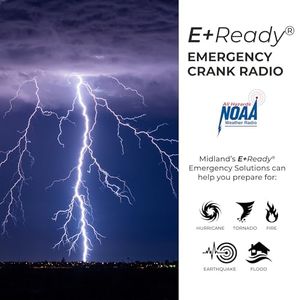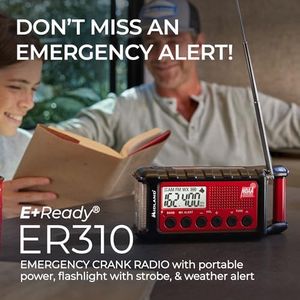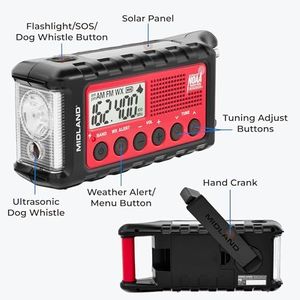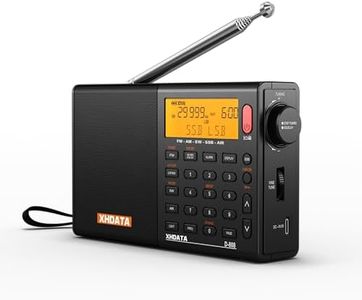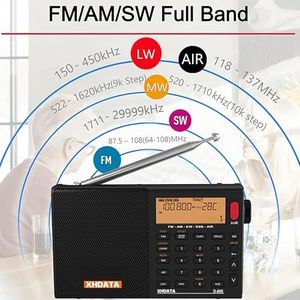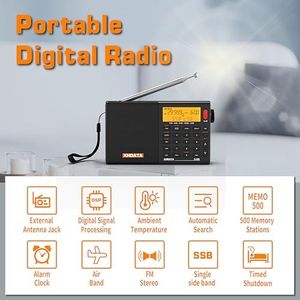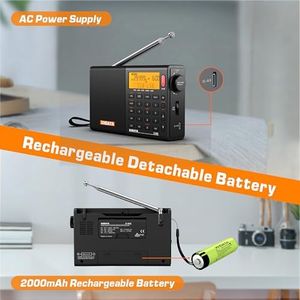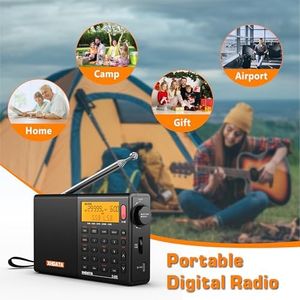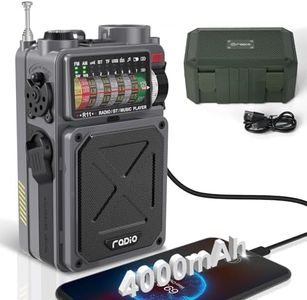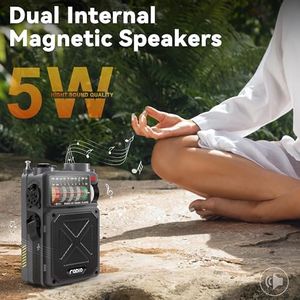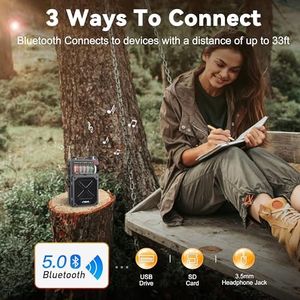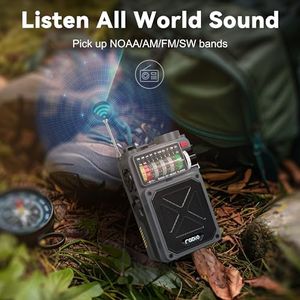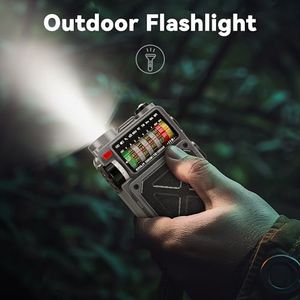10 Best Shortwave Radios 2026 in the United States
Winner
C. Crane CC Skywave SSB 2 AM, FM, Shortwave, NOAA Weather + Alert, Scannable VHF Aviation Band and Single Side Bands Small Battery Operated Portable Travel Radio Includes SW Wire Antenna Adapter
C. Crane CC Skywave SSB 2 AM, FM, Shortwave, NOAA Weather + Alert, Scannable VHF Aviation Band and Single Side Bands Small Battery Operated Portable Travel Radio Includes SW Wire Antenna Adapter
Chosen by 1120 this week
Tecsun PL990 Digital Worldband AM/FM Shortwave Longwave Radio with Single Side Band Reception & MP3 Player, Matte Black
Tecsun PL990 Digital Worldband AM/FM Shortwave Longwave Radio with Single Side Band Reception & MP3 Player, Matte Black
Raddy RF919 SSB Shortwave Radio with NOAA Weather Band, Full Band FM AM SW VHF UHF AIR CB WB and SSB Receiver, with Antenna Tuner, 3 External Antenna Ports, 5000mAh Rechargeable Battery (Black)
Raddy RF919 SSB Shortwave Radio with NOAA Weather Band, Full Band FM AM SW VHF UHF AIR CB WB and SSB Receiver, with Antenna Tuner, 3 External Antenna Ports, 5000mAh Rechargeable Battery (Black)
Eton Elite Field Radio with AM/FM, Shortwave, RDS, Bluetooth, Digital Tuning, Treble/Bass Control, 50 Memory Stations, External Antenna, Rich LCD Display, Retro Tabletop Design
Eton Elite Field Radio with AM/FM, Shortwave, RDS, Bluetooth, Digital Tuning, Treble/Bass Control, 50 Memory Stations, External Antenna, Rich LCD Display, Retro Tabletop Design
Tecsun H501 Digital Worldband AM/FM Shortwave Longwave Radio with SSB Reception, Dual Speakers, & MP3 Player, Matte Black
Tecsun H501 Digital Worldband AM/FM Shortwave Longwave Radio with SSB Reception, Dual Speakers, & MP3 Player, Matte Black
Tecsun PL880 Portable Digital PLL Dual Conversion AM/FM Longwave Shortwave Radio with SSB (Single Side Band) Reception
Tecsun PL880 Portable Digital PLL Dual Conversion AM/FM Longwave Shortwave Radio with SSB (Single Side Band) Reception
C. Crane CCRadio 3 Long Range Reception AM, FM, NOAA Weather Plus Alert and 2-Meter Ham Band Portable Digital Radio with Bluetooth
C. Crane CCRadio 3 Long Range Reception AM, FM, NOAA Weather Plus Alert and 2-Meter Ham Band Portable Digital Radio with Bluetooth
Midland - ER310, Emergency Crank Weather AM/FM Radio - Multiple Power Sources, SOS Emergency Flashlight, Ultrasonic Dog Whistle, & NOAA Weather Scan + Alert (Red/Black)
Midland - ER310, Emergency Crank Weather AM/FM Radio - Multiple Power Sources, SOS Emergency Flashlight, Ultrasonic Dog Whistle, & NOAA Weather Scan + Alert (Red/Black)
XHDATA D808 Portable AM FM SW LW Air Band Shortwave Radio SSB RDS Multi Band Digital Radio Speaker with LCD Display Alarm Clock External Antenna (Black)
XHDATA D808 Portable AM FM SW LW Air Band Shortwave Radio SSB RDS Multi Band Digital Radio Speaker with LCD Display Alarm Clock External Antenna (Black)
Emgykit R11 Portable Shortwave Radio - 4000mAh/14800mWh NOAA/SW/AM/FM, Solar/Hand Crank/USB Charging, Bluetooth Receiver/USB/TF Playback,with Compass,Flashlight,SOS for Camping & Emergencies - Grey
Emgykit R11 Portable Shortwave Radio - 4000mAh/14800mWh NOAA/SW/AM/FM, Solar/Hand Crank/USB Charging, Bluetooth Receiver/USB/TF Playback,with Compass,Flashlight,SOS for Camping & Emergencies - Grey
Our technology thoroughly searches through the online shopping world, reviewing hundreds of sites. We then process and analyze this information, updating in real-time to bring you the latest top-rated products. This way, you always get the best and most current options available.

Our Top Picks
Winner
C. Crane CC Skywave SSB 2 AM, FM, Shortwave, NOAA Weather + Alert, Scannable VHF Aviation Band and Single Side Bands Small Battery Operated Portable Travel Radio Includes SW Wire Antenna Adapter
Most important from
133 reviews
The C. Crane CC Skywave SSB 2 is a versatile and compact multiband radio ideal for travel and emergency situations. It covers a wide range of frequencies including AM, FM, NOAA Weather, Shortwave (1711-29999kHz) with Single Side Band, and VHF Aviation bands. This broad frequency coverage makes it a valuable tool for receiving long-range information, especially during natural disasters when conventional communication systems may fail.
The inclusion of Single Side Band (SSB) is a notable strength, providing a reliable way to tune into distant signals, which isn't possible on standard smartphones. The radio's sensitivity and selectivity are enhanced by multiple bandwidth settings, and it offers both fast and fine tuning on all bands, giving users precision in their searches. With 400 memory slots and a digital tuning system, it’s easy to store and access favorite stations.
Its small size and lightweight design (6 oz without batteries) make it highly portable. Accessories like a fold-out stand, earphones, a carry case, and a 23 ft portable shortwave reel antenna enhance its usability and reception quality. However, the reliance on AA batteries (not included) for power, though it provides up to 70 hours of usage with earbuds, might be seen as a limitation for some users, especially those who prefer rechargeable options. The optional AC power adapter adds flexibility but comes at an additional cost. The radio's build quality and the inclusion of a high-quality speaker ensure a good listening experience. This radio is especially suitable for those who need a reliable backup communication device and enjoy accessing a wide range of radio frequencies on the go.
Most important from
133 reviews
Tecsun PL990 Digital Worldband AM/FM Shortwave Longwave Radio with Single Side Band Reception & MP3 Player, Matte Black
Most important from
283 reviews
The Tecsun PL990 Digital Worldband Radio is a feature-packed device that excels in frequency coverage, offering AM, FM, longwave, shortwave, and single side band (SSB) reception. This makes it highly versatile for radio enthusiasts who want to explore a wide range of frequencies. The radio utilizes advanced technologies like analog high-IF AM circuitry and DSP digital demodulation, which significantly enhance its sensitivity and selectivity, allowing for clearer and more reliable reception even in challenging environments. Additionally, the synchronized detection feature helps minimize interference, ensuring a better listening experience.
The inclusion of an MP3 player with support for various audio formats adds more utility, making it great for both radio listening and personal entertainment. The sound quality is commendable, thanks to the premium full-range speaker and class AB amplifier, delivering rich and dynamic audio. The portability of the Tecsun PL990 stands out due to its compact and lightweight design, making it easy to carry around. It also offers multiple convenient features like an alarm clock, sleep timer, USB audio input, and external antenna input. The 3,150 memory slots for station presets are particularly useful for regularly tuning into favorite channels.
However, there are a few drawbacks. The radio is battery-powered, and although a lithium-ion battery is included, it might not be ideal for long-term usage without frequent recharging. Some users may find the multitude of features overwhelming to navigate initially. Additionally, while the product includes stereo earphones and an SD card, the lack of standalone lithium batteries in the package may be a minor inconvenience for some. In summary, the Tecsun PL990 is an excellent choice for those needing a multi-functional and portable shortwave radio with robust performance and extra features for a rich listening experience.
Most important from
283 reviews
Raddy RF919 SSB Shortwave Radio with NOAA Weather Band, Full Band FM AM SW VHF UHF AIR CB WB and SSB Receiver, with Antenna Tuner, 3 External Antenna Ports, 5000mAh Rechargeable Battery (Black)
Most important from
263 reviews
The Raddy RF919 SSB Shortwave Radio stands out with its multi-band reception capabilities, covering FM, AM, SW, SSB, VHF, UHF, AIR, CB, and WB frequencies, making it versatile for users interested in various broadcasting channels. Its dual knob tuning system allows for precise adjustments, which is great for those who enjoy fine-tuning their reception. The dual screens are a nice touch, providing useful information about signal strength and reception status, while the customizable backlight adds a bit of flair.
Portability is another highlight, thanks to the 5000mAh rechargeable battery, which ensures longer usage without frequent recharging. The addition of three external antenna ports enhances reception, allowing users to connect for improved signal quality. The integration of Bluetooth further adds value, letting users stream music from their devices, which can be particularly appealing for those who want a dual-function radio.
However, there are some drawbacks to consider. While the radio is lightweight and portable, its size may still be cumbersome for some, especially if they plan to carry it for long distances. The reliance on an app for full control might be off-putting for users who prefer a traditional hands-on experience without additional technology.
